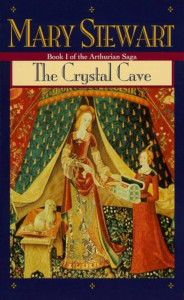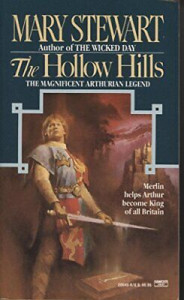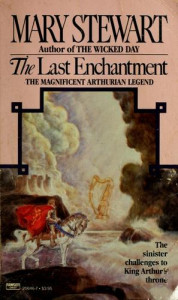 Rebecca Swain wrote this review.
Rebecca Swain wrote this review.
“Not by appointment do we meet delight,” poet Gerald Massey said, and I have found this to be true. I met one of the greatest delights of my life while browsing in my high school library many years ago. Quite by chance I discovered Mary Stewart’s classic and influential Merlin trilogy, made up of The Crystal Cave, The Hollow Hills, and The Last Enchantment, originally published in the 1970s. Since then, this trilogy has been my standard for judging Arthurian retellings.
Stewart’s well-researched trilogy is set in fifth-century Britain and is told from the point of view of Merlin. Stewart’s Merlin is an extremely sympathetic character, and the author does an excellent job of emphasizing both his humanity and his wizardliness. For example, Merlin can see visions in the firelight and thus foretell the future, and he can bend men to his will simply by telling them what he wants them to do. He can project an intensely powerful image of himself, partly through magic and partly through his own confidence in his destiny.
Yet he is not very good at some of the human things that make a man respected in his society. He is only a mediocre horseman, and a poor swordsman. He gets violently seasick, and until he is old he is impotent (though this is because he willingly channels all his power into magic rather than dissipating it in sexual activity). He is also sometimes obtuse in his dealings with other people, usually seeing only what the gods allow him to see.
The Crystal Cave follows Merlin from childhood to young manhood. He grows up at the court of his grandfather, a local king in Maridunum, in what is now Wales. He is barely tolerated there because he is a bastard and his mother, Niniane, will not name his father. He is feared and disliked by his family and countrymen because he is quiet and strange, and has odd powers. These powers are nurtured by Galapas, an old wizard Merlin meets in the hills, in a cave where firelight reflects from the crystal walls and creates visions of the future.
When Merlin is twelve he leaves his home after performing a dramatic act of defiance and revenge for the death of his servant. He finds a place in the service of the count Ambrosius, who, with his brother Uther, is trying to wrest the title of high king from Vortigern, who has called Hengest and his Saxons to help him hold onto his throne. Five years later Merlin confronts Vortigern, who is looking for a fatherless boy to sacrifice so that the foundations of his fort will stand. Merlin predicts Vortigern’s downfall and the triumph of the house of Pendragon, and henceforth has a reputation as a magician and wizard. This book ends on the night Uther and Ygraine lie together and she conceives Arthur.
This book begins Stewart’s trilogy-long exploration of how fact metamorphoses into legend. In these novels Merlin does have magic powers, but as these powers are witnessed by the people surrounding him, even the human things he does become magical in the telling. He becomes aware of this even in his own lifetime. For example, he raises the stones in Stonehenge for Ambrosius, mostly an engineering feat, but as time passes stories attribute it more and more to his wizard’s talents. Likewise, he  intentionally turns Guinevere’s abduction by King Melwas (in The Last Enchantment) into a tale much like the Greek myth of Persephone in order to spare Guinevere and Arthur shame. Watching Merlin’s life turning to legend before his eyes parallels the formation of the Arthurian legend itself
intentionally turns Guinevere’s abduction by King Melwas (in The Last Enchantment) into a tale much like the Greek myth of Persephone in order to spare Guinevere and Arthur shame. Watching Merlin’s life turning to legend before his eyes parallels the formation of the Arthurian legend itself
The Hollow Hills takes up the story the morning after Arthur’s conception. In the course of this book Arthur is born and is given secretly to Merlin, who takes him to Count Ector to raise. When Arthur is about nine years old, Merlin takes up residence in a chapel near Ector’s castle and begins to tutor the boy, without revealing his or Arthur’s identity to his pupil. Stewart does a wonderful job of describing the shining promise in this very idealized Arthur, and the close bond that develops between Merlin and the boy.
The book ends with Arthur lifting Excalibur and being recognized as the rightful king of Britain. He doesn’t draw the sword from a stone to be used in a tournament, however, as many versions tell. Instead, the dying Uther identifies Arthur, now fourteen, as his son and heir. When Lot and other landholders object, Merlin takes everyone to the chapel where he has placed the ancient sword of Maximus on the altar. Only the chosen king can lift it, and before the eyes of the wondering men, Arthur does so.
A recurring motif in this trilogy is that of light. The Hollow Hills is a novel drenched in light: sunlight; the vision-bringing red-gold of firelight; the supernatural light limning sacred objects such as the sword, and, near the end, the flash of jewels. In this book the light shines on a relatively peaceful period in the lives of Merlin and Arthur. Ambrosius’ battles are over and Uther’s are far away from the wizard and his pupil. Arthur’s battles are yet to come. People and events are developing, falling into place for the prophesied glory.
The Last Enchantment begins with a premonition of the coming disaster to Arthur and his kingdom. Overshadowing what should be the happiest time  of his life, being feted and honored as king, is his realization that he has unwittingly committed incest with his half-sister Morgause (Uther’s illegitimate daughter), and the knowledge that she is carrying his child. He and Merlin struggle over whether to kill them, but in the end the decision is taken out of their hands. Morgause’s husband Lot tries to destroy the baby by killing all the children born in his lands since May Day, and this horrific act is soon attributed to Arthur. So his reign begins on a false and savage note.
of his life, being feted and honored as king, is his realization that he has unwittingly committed incest with his half-sister Morgause (Uther’s illegitimate daughter), and the knowledge that she is carrying his child. He and Merlin struggle over whether to kill them, but in the end the decision is taken out of their hands. Morgause’s husband Lot tries to destroy the baby by killing all the children born in his lands since May Day, and this horrific act is soon attributed to Arthur. So his reign begins on a false and savage note.
This last book in the trilogy describes Arthur’s reign, his marriage to Guinevere (actually to two different Guineveres), and his final subjugation of the Saxons. There is no Lancelot in Stewart’s version, because, she says, she found no Lancelot in her research into the real Arthur. Bedwyr, Arthur’s boyhood friend, is the knight who loves the second Guinevere.
The Last Enchantment is in many ways a sad book, not just because Arthur’s doom is foreshadowed, but because Merlin realizes that he is losing his own magic power. His last great act is to get Arthur crowned king, and after that he begins to lose the ability to foretell the future and to command men. He suffers various illnesses and gradually becomes merely an old man content to sit by the fire and wait for Arthur to visit. For a man who loves the power the gods granted him, this is a heavy blow, though Merlin accepts it with his usual grace and courage.
There are two characteristics of this series that make it stand out in my mind above all the other versions I have read. The first is the sheer beauty of Mary Stewart’s writing. She describes nature, people, and places in a vivid, detailed manner that brings them to life and adds richness and depth to the story she presents. She does not just describe events; she describes the color of the grass and the quirk of the lips as these events occur.
The second characteristic is her depiction of the deep, compelling love between Merlin and Arthur. The wizard devotes his life to Arthur. He paves the way for his birth, watches over him while he is a boy, and provides the means for Arthur to be accepted as king. In turn, Arthur comes to love and trust the man who is the one constant in his life, and he continues to rely on Merlin after he has become king. An unbreakable bond is created between these two very different men.
In short, these novels are everything the Arthurian legend should be. They are full of noble characters and great deeds, and deep emotion without sentimentality. They are dignified and graceful, and they leave the reader in no doubt as to why the legendary Arthur is still remembered today.
(There is a fourth book in this series, The Wicked Day, but it is separate from this trilogy because it is told from Mordred’s point of view and is no longer the story of Merlin. It contains details of the knights of the Round Table and Mordred’s final revenge on his father.)
(Ballantine, 1996)
